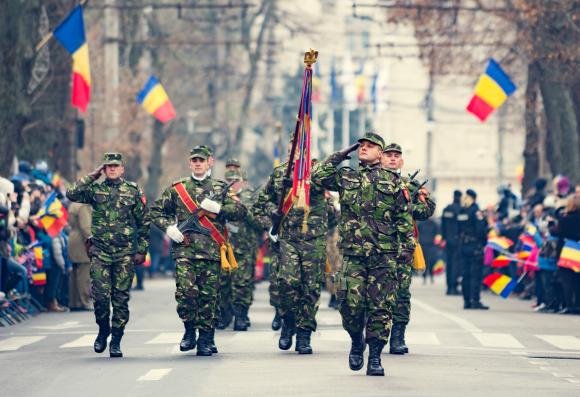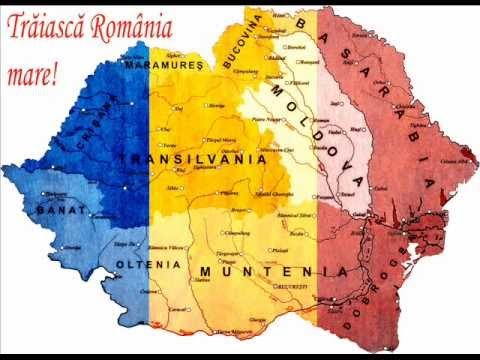The Great Union from 1 December 1918- A day for eternity in the history of Romania
The meaning of 1 December 1918 for my country, Romania at the present times

(Image source: Ziua Nationala. Agerpres)
On December 1, 2017, all Romanians celebrated the National Day of Romania, an occasion for organizing the 1'st of December parade as well as numerous National Day events and demonstrations. Day of 1'st of December, 2017 marked the 99th anniversary of the Union of the Principalities of Transylvania, Banat, Crisana and Maramures with the Romanians, which took place on 1 December 1918.
1'st of December was declared the National Day of Romania back in 1990 and has a special significance in our country's history. Every year, on this date, for the National Day of Romania are being organized military parades in Bucharest (which is my hometown and the capital city of Romania), Alba-Iulia or Timisoara, where thousands of people are expected.
National Day of Romania was not always celebrated on 1'st of December. Between 1866 and 1947, Romania celebrate it on May 10, the day when Prince Carol of Hohenzollern-Sigmaringen sworn in front of the representative assembly of the United Romanian Principalities in 1866.
Between 1948 and 1989, day of 23 August was considered and celebrated as National Day of Romania. After the fall of communism, the president in that period of time, Ion Iliescu, promulgated the Law no. 10 of July 31, 1990, according to which December 1 was declared a national day and a public holiday. Subsequently, this date was also included in the Romanian Constitution of 1991, at Article 12, paragraph 2.

(Source & more info: http://www.army.md/?lng=3&action=show&cat=122&obj=4678#.Wl9Wm6iWZxA)
The First of December Bucharest parade took place last year at the Arc de Triomphe Square, where the soldiers march on Kiseleff Boulevard towards Free Press Square and the surrounding traffic was restricted.
Approximately 3500 soldiers and specialists from the Ministry of National Defence, the Ministry of Internal Affairs and the Romanian Intelligence Service, with more than 350 technical conveyance, including about 50 aircraft and military from several allied or partner countries participated on Friday, 1 December, starting at 11 AM, at the Military Parade.
(Quoted from source: https://www.digi24.ro/stiri/actualitate/1-decembrie-2017-ziua-nationala-a-romaniei-repetitii-pentru-parada-militara-833839)
On this special day, me and my family preferred to stay at home and watch at tv the Parade, and drink a glass of wine together, celebrating and feeling deep in our hearts the symbolism of this important day.
The historical importance of the year 1918 for Romanians

(Image source: http://bistritanews.ro/index.php?mod=article&cat=32&article=21778)
The attainment of Great Romania by uniting Basarabia, Bucovina and Transylvania with the Old Kingdom was the outcome of the Romanians' feat in the favorable conditions created by the end of the First World War, when the Tsarist and Austro-Hungarian Empires vanished from the map of Europe.
The triggering of the Bolshevik revolution in October 1917 was, in fact, more of a coup d'état through which the Bolsheviks obtained the power. The Council of People's Commissars, led by V.I. Lenin, adopted the Peace Decree expressing the decision to remove the country out of the war, and the Declaration of Peoples' rights in Russia. which recognized their right to self-determination, going as far as state separation. Based on this principle, some of the territories occupied by the Russian Empire will proclaim their independence.
The first romanian province which united with its motherland was Basarabia. In 1917 the Moldavian National Party was formed, which will coordinate the movement of the liberation of Basarabia. On the occasion of the Congress of the moldovian soldiers gathered at Chisinau (November 1917), the party proclaims the political and the territorial autonomy of Basarabia, decides to form its own armed forces and convene a representative body of Basarabia, Country Council, leaded by Ion Inculet. The whole autonomy fulfilment was done through the proclamation of the Moldovian Democratic Republic (December 1917), member with full rights within Russian Federative Republic.
The situation is getting worse along with the Bolshevik state coup, followed by dissolution of the Russian army. In order to put an end to the anarchy and the havoc caused by the russian soldiers during their retreat, the support of romanian army is being asked. This will restore the order and prestige of the Country Counsel, which will cause the government of Sovietic Russia to interrupt diplomatic relations with Romania.
Faced with the threats of Russia and Ukraine, Basarabia proclaimed its independence (February 4, 1918), and on March 27, 1918, the Country Council, which included representatives of all nationalities, adopted by majority vote the decision of Basarabia to unite with Romania.
During the first world confrontation, Bucovina was a theater of war, many young people being enrolled in the Austro-Hungarian army. Since autumn 1918, the province's situation has worsened. In the context of the reorganization of the Empire on federal basis, the Habsburg authorities used the thesis of annexing Bucovina to Galitia. Likewise, Ukraine had claims of domination over the province, threatening with military intervention. In October 1918, at the initiative of Sextil Puşcariu and Iancu Flondor, at Cernauti was convoked a a meeting of representatives of the romanian people which chose the National Council. Iancu Flondor was elected as its political leader. The Ukrainian threat urged him to ask for support from the Romanian army. On November 28, 1918, the General Assembly of Bucovina, consisting of representatives of the Romanians, Poles, Germans and Ruthenians, voted for the union with the Kingdom of Romania. Austria recognizes Romania's union with Bucovina through the Treaty of Saint-Germain.
As far as Transylvania is concerned, since the beginning of the First World War the romanians' fighting resources and means for uniting with the country have been diversified, activity coordinated by the Romanian National Party (NNR) ( in romanian language- P.N.R.). In the autumn of 1918, in the circumstances of the defeat of the Central Powers and the collapse of Austro-Hungary, the national movement of the romanians within Transylvania increased. P.N.R. proclaims in Oradea the national independence of the Romanians in the Dual Monarchy, and on November 12, 1918, the Central Romanian National Council (CNRC), headquartered in Arad, was formed to coordinate the national movement of the Transylvanian Romanians as a single organ. According to its model, local councils and guards were established in Transylvania. They took over political and administrative control throughout the province, managing to maintain order in Transylvania.
In order to express the will of the Transylvanian Romanians, C.N.R.C. decides to convene a large gathering for December 1, 1918, at Alba Iulia. The Great National Assembly opens under the presidency of Gheorghe Pop of Băseşti in the presence of 1228 delegates, the Orthodox Bishop Miron Cristea, the Greek-Catholic Bishop Iuliu Hossu and over 100,000 people. Vasile Goldiş will read the Resolution of the Union with Romania (promoted democratic principles, equality of minorities with the Romanian nation, universal vote, citizens' liberties). The next day the interim bodies of the state power were elected: the Grand National Council and the Conducting Council, chaired by Iuliu Maniu. The Union was welcomed and recognized by the Transylvanian nationalities. Hungary recognizes the union within the Treaty of Trianon (1920).
The Great Union of 1918 crowned the aspirations of the Romanians for centuries to live in a single state, being the fruition of the struggle of all the forces and domestic social categories. Thus, the formation of Great Romania was completed. The new Romanian state, with an area of 295,049 km2 and a population of 18 million, will be internationally recognized through the peace treaties concluded in Paris in 1919-1920.
(Source inspiration: https://istoriiregasite.wordpress.com/2012/06/03/anul-1918-in-istoria-romanilor/)
To conclude with the solemn words of the President of the Great Assembly in Alba Iulia on December 1, 1918 - Gheorghe Pop de Băseşti, namely: "The union is the fundamental stone of the happiness of our Romanian people", a "reality for all ages" and a " day of eternal justice ". And we would say a great lesson of patriotism, glorious deeds of our forefathers, for the full unity and harmony of Romania, for the defense and protection of our national dignity ... "
(Relevant sources: http://www.gorjeanul.ro/cultura-2/marea-unire-de-la-1-decembrie-1918-o-zi-pentru-eternitate-in-istoria-romaniei#.Wl8zm6iWZxB)
I cannot express in words the joy I have for the chance I was given to write about the history of my country, which is one of the greatest reasons why I am proud of and enjoy being a Romanian!
Thank you @sndbox!! #explore1918
Really enjoyed reading this. I found it interesting and factual. It did make me get angry at governing power a little though, not your fault of course. I just think ruling powers lie to the people in order to subjugate them. Resolution of the Union been a noted point and the way minorities are actually treated in Romania. Roma are treated like vermin by some.
This post was upvoted and resteemed by @resteemr!
Thank you for using @resteemr.
@resteemr is a low price resteem service.
Check what @resteemr can do for you. Introduction of resteemr.
My Ultimate is Charging ...
hi @r351574nc3 , what you meant by this image:)?
Oh, it means a couple things. My voting power is low, so I'm waiting for it to recharge. There is also a popular overwatch meme around charging an ultimate move. It's like saying my vote is an ultimate move that is charging up.
Oh ok:), thank you for your answer but..why your vote has no power @r351574nc3 (https://steemworld.org/@r351574nc3) ?? Does this has something to do with the conflict i read on your comment last days?
Yes it does. Whenever you vote (up or down), your voting power will reduce. It recovers 20%/day. I've been using more than 20%/day voting power, so my voting power is really low and will take a few days to get back up.
It's all because I am upvoting posts for people have lost money.
Oh man..you.re doing a really nice thing and i wish the birocracy thing would end so everybody could just enjoy being here...have you tried creating a group @r351574nc3 ?